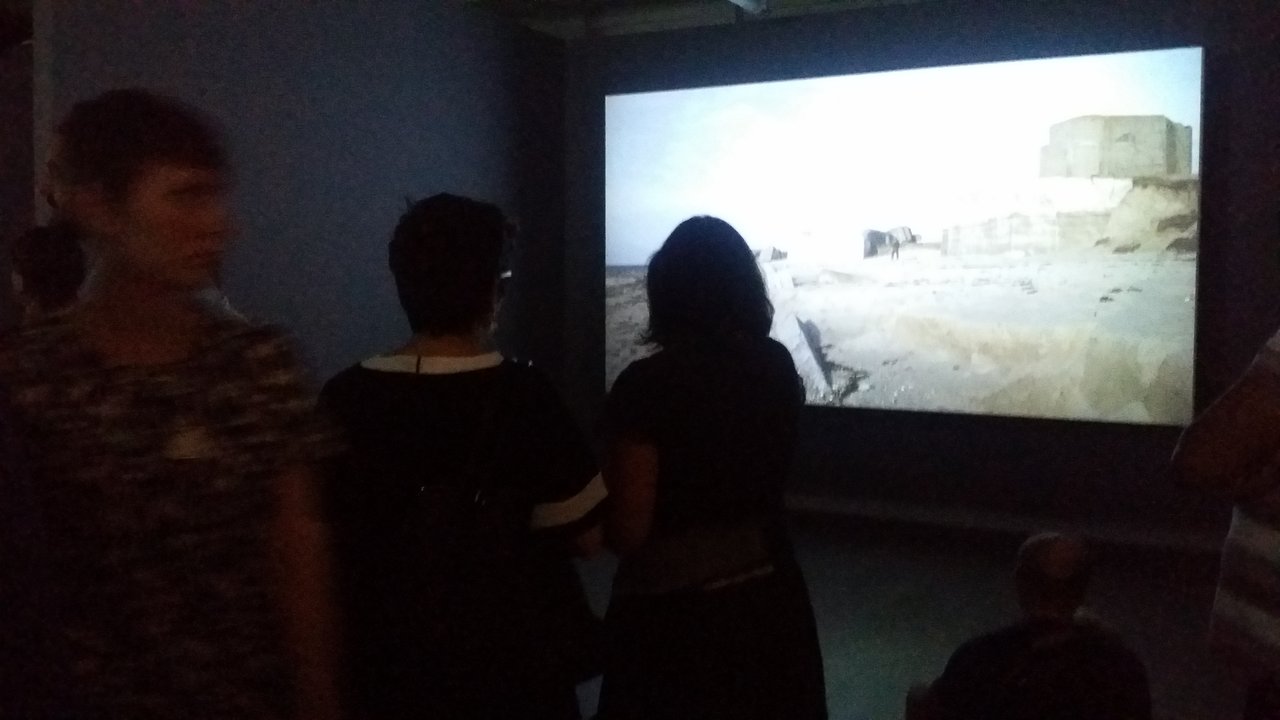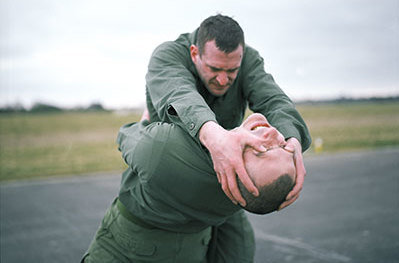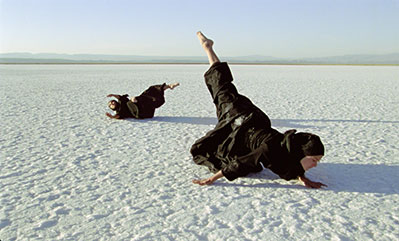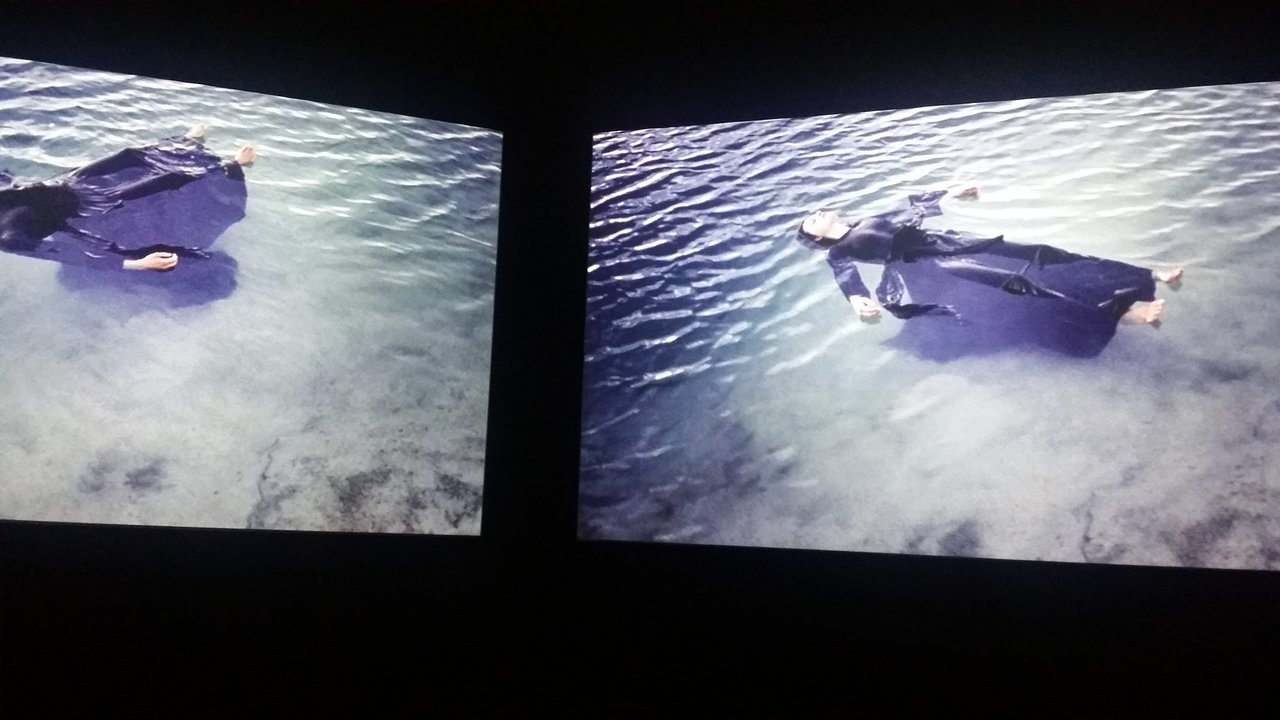Artscape Youngplace is more than just a gallery space for Koffler. It is a place to cultivate the artistic mind, share ideas, develop a sense of community, and grab some morning coffee. Equivalently, Isabel Rocamora’s Troubled Histories, Ecstatic Solitudes is more than just an art exhibition. It’s a complex exploration into contemporary existence and its overlap with religions and violent pasts.
 Guest watching Body of War, a film by Isabel Rocamora, UK, 2010. Photo: Sunny Kim
Guest watching Body of War, a film by Isabel Rocamora, UK, 2010. Photo: Sunny Kim
Written on the North wall of the entrance hallway are two questions: “What do you know about yourself?” and “What do you know about others?”. Markers were laid out and people soon began writing their answers on the wall. It was an interesting way to encourage self-reflection before even looking at the works in the exhibition. After looking at these questions, the audience enters with these two questions in mind, and automatically relates it to the videos being played.
The largest and the most recent work by Rocamora is Faith, a triptych film. Each screen contains praying rituals for the three dominant religions in Jerusalem: Orthodox Judaism, Greek Orthodox Christianity, and Sunni Muslim. All set in a desert landscape, it features a man in each screen. Interestingly, the first man is wearing half black and half white attire, the second all black, and the third all white. They all take their time to perform. Perform is probably not a correct word. What follows on camera is too genuine and too mundane to be labelled a ‘performance’. There is an air of respect in this presentation; every time one man performs, the others seem to stay silent, although there are slight overlap at times. What could initially be seen as a radical conflict of interest is instead portrayed as a space for tolerance, and surprising similarities. All three man share a connection: through the soil, the landscape, their bodies become extensions of the land.
 Film stills of Faith, a three channel film by Isabel Rocamora, 22 mins, UK, 2 K to HD, 2015. Courtesy of the artist and Galeria SENDA.
Film stills of Faith, a three channel film by Isabel Rocamora, 22 mins, UK, 2 K to HD, 2015. Courtesy of the artist and Galeria SENDA.
On the side is Body of War, which features soldiers reenacting physical combat. It does not seem to be a real fight; it is slowed down, and intentionally paused in the moments that resemble emotional embrace rather than violence. There’s a focus on their faces as they become distorted with extreme emotions. They embrace, then they fight, then repeat. All we hear is sombre music, and the rough breaths of soldiers.
 Film Still of Body of War, a film by Isabel Rocamora, U.K, 2010. Courtesy of Galeria SENDA.
Film Still of Body of War, a film by Isabel Rocamora, U.K, 2010. Courtesy of Galeria SENDA.
Across that is Horizon of Exile. This diptych presents two women. Two older women are seen cooking, then cuts to landscape. The two screens are balanced by having one slow panoramic shot while the other a more dynamic POV shot. We are gradually introduced to two young women wearing long black cloths in the style of chadors. The two women wake up, then starts performing rituals or dances. It features breathtaking editing, where, during moments of sharp movements, the angle for both shots instantly change, for greater dramatic impact. Eventually they are seen in a snowy landscape, performing agonizing choreography that forces them to contort their bodies. Almost as if being moved by outside forces rather than by themselves, these women maintain a face of distance and indifference, which only makes their movements more powerful. The ending features the two women, still in the same attire, floating in a clear body of water, and it’s one of the most gorgeous shots in the show. The blackness becomes shapes that creates dynamic compositions for the screen, and the stillness quite literally takes your breath away.
 Film still of Horizon of exile, dual channel installation film by Isabel Rocamora. © The artist, 2007. Courtesy of Galeria SENDA.
Film still of Horizon of exile, dual channel installation film by Isabel Rocamora. © The artist, 2007. Courtesy of Galeria SENDA.
 Installation view with Film still of Horizon of exile, dual channel installation film by Isabel Rocamora. Photo: Sunny Kim
Installation view with Film still of Horizon of exile, dual channel installation film by Isabel Rocamora. Photo: Sunny Kim
Troubled Histories, Ecstatic Solitude definitely requires repeated viewings. While the sombre music from the headphones is not a necessity, muting outside noises helps the viewer exist in isolation, and become absorbed into the films. Rocamora has created deeply reflexive films that makes viewers question identity, religion, and the past in highly personal terms.
Sunny Kim
*Exhibition information: September 17 – November 29, 2015, Koffler Gallery, Artscape Youngplace, 180 Shaw Street, Toronto.

